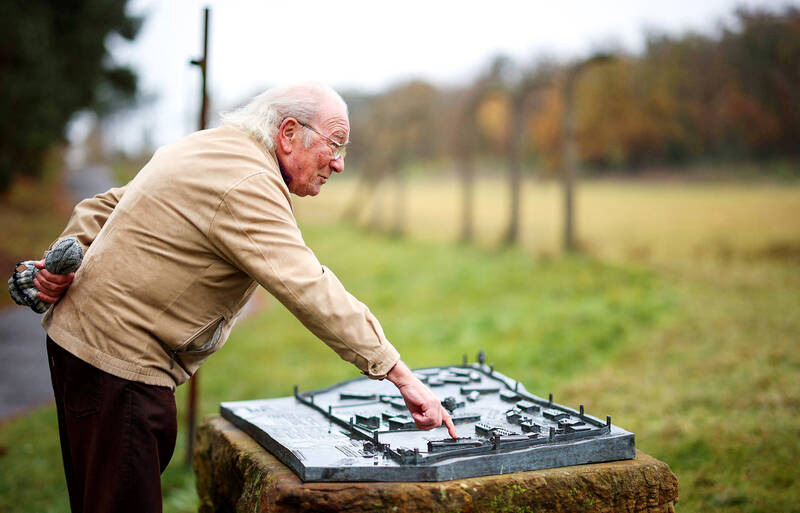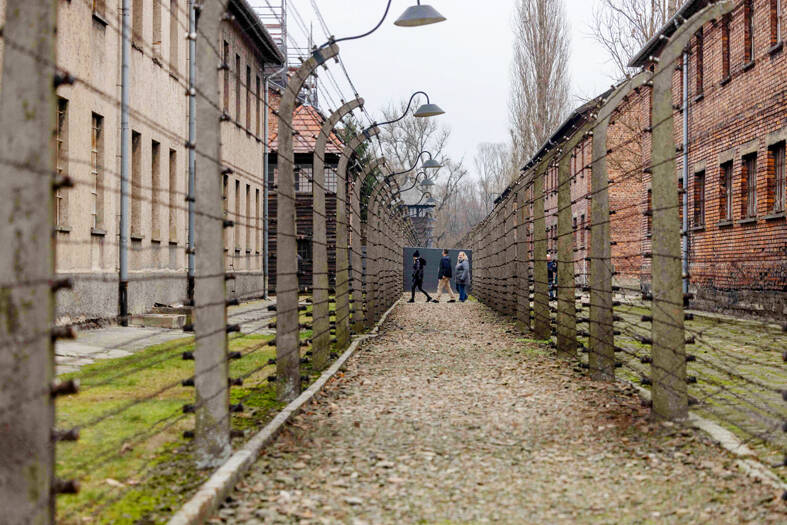For 80 years, details of their ancestors’ collaboration with the Nazis have been buried in spotless rows of filing cabinets in The Hague. But thousands of Dutch families face having their relatives’ history laid bare when an archive opens on 425,000 people accused of siding with the occupier during the World War II.
The central archives of the special jurisdiction courts (CABR), established after the allies liberated the Netherlands to bring collaborators to justice, will open today under national archive rules.
Until now, the most visited war archive in the Netherlands has been accessible only to researchers, those involved and direct descendants. But from today the physical archive will open to general visitors.

Photo: AFP
For the first three months of this year, researchers and descendants of victims and alleged perpetrators will also have digital access to a quarter of this extraordinary database — on site at the national archive in The Hague — for the first time.
Relatives have mixed feelings about the move.
“It’s a bit uncomfortable,” said Connie, 74, one of three sisters whose family history is contained in the archive. “I don’t know what could come out of it eventually, if people Google our surname.”

Photo: AFP
But some in the Netherlands believe that openness about the country’s wartime past, including its economic and bureaucratic collaboration, is crucial. Three-quarters of the Dutch Jewish population — more than 102,000 people — were murdered by the Nazis, with antisemitic collaboration from the state, police and some of the Dutch population.
It is a past that the country is only now coming to terms with, opening a national Holocaust museum, making a public apology and funding research into the role of institutions and transport firms.
“This is part of the repression by the Dutch of their memories of collaboration, after we had punished our military and political collaborators,” said Johannes Houwink ten Cate, an emeritus professor of Holocaust studies at Amsterdam University. “I can understand the children and grandchildren of collaborators now fear possible consequences, but my personal experience is that their feelings come to rest once they have seen the files. Making this open is an important step.”

Photo: AFP
Initially, the intention had been to put the archive online at the Web site Oorlog voor de Rechter (“war before the judges”). But the prospect sparked public disquiet and the Dutch Data Protection Authority (AP) issued a warning that putting the archive of suspected collaborators online would breach privacy laws.
“In the spring of 2024, the AP had a signal from a surviving relative that the planned publication of the CABR was possibly not being organized in a lawful way,” it announced. “The national archives must now start working on an alternative method.”
Online publication is delayed and the culture minister, Eppo Bruins, says the archive should not be indexable by search engines such as Google. But eventually it is hoped that 30 million pages of witness reports, diaries, membership cards for the Dutch fascist party, medical records, court judgments, pardon pleas and pictures will all be searchable.
At a recent event at the NIOD Institute for War, Holocaust and Genocide Studies in Amsterdam, the director, Martijn Eickhoff, said the special court archive from 1944 and 1952 was a valuable historical resource. But it was also a period of wild accusation, he said: fewer than 15 percent of suspects were punished by tribunals and extraordinary courts, and two-thirds not at all.
“It is important to look at this archive carefully,” he said. “If a text is misleading, people become critical about the source, and this is what you learn to do as a historian … But because it contains so many personal documents, this affects people enormously.”
He compared the Dutch archive with modern-day Syria, where global experts are working to preserve evidence of crimes under the toppled dictator Bashar al-Assad.
“We hope to lead this experiment [opening the archive] on the right tracks. Not to open the door again to collective hatred,” he told a room of descendants, including Connie and her sisters Jolanda and Mieke.
The sisters, who asked for their surname not to be published, have different feelings about the opening of the archive. While Connie is concerned, Jolanda, 70, said she did not mind and Mieke, 68, said she was keen to see her grandfather’s dossier. He had a building company that carried out work for the Nazis, and in the reckoning after the war he was punished for it. The sisters’ father worked there too.
“But he was 18,” said Jolanda. “I don’t know what other things my grandfather believed, but Dad believed in a better world, not in Nazi ideology … But you can make choices, like my father’s family. Sometimes it’s a bad choice.”

In the March 9 edition of the Taipei Times a piece by Ninon Godefroy ran with the headine “The quiet, gentle rhythm of Taiwan.” It started with the line “Taiwan is a small, humble place. There is no Eiffel Tower, no pyramids — no singular attraction that draws the world’s attention.” I laughed out loud at that. This was out of no disrespect for the author or the piece, which made some interesting analogies and good points about how both Din Tai Fung’s and Taiwan Semiconductor Manufacturing Co’s (TSMC, 台積電) meticulous attention to detail and quality are not quite up to

April 21 to April 27 Hsieh Er’s (謝娥) political fortunes were rising fast after she got out of jail and joined the Chinese Nationalist Party (KMT) in December 1945. Not only did she hold key positions in various committees, she was elected the only woman on the Taipei City Council and headed to Nanjing in 1946 as the sole Taiwanese female representative to the National Constituent Assembly. With the support of first lady Soong May-ling (宋美齡), she started the Taipei Women’s Association and Taiwan Provincial Women’s Association, where she

Chinese Nationalist Party (KMT) Chairman Eric Chu (朱立倫) hatched a bold plan to charge forward and seize the initiative when he held a protest in front of the Taipei City Prosecutors’ Office. Though risky, because illegal, its success would help tackle at least six problems facing both himself and the KMT. What he did not see coming was Taipei Mayor Chiang Wan-an (將萬安) tripping him up out of the gate. In spite of Chu being the most consequential and successful KMT chairman since the early 2010s — arguably saving the party from financial ruin and restoring its electoral viability —

It is one of the more remarkable facts of Taiwan history that it was never occupied or claimed by any of the numerous kingdoms of southern China — Han or otherwise — that lay just across the water from it. None of their brilliant ministers ever discovered that Taiwan was a “core interest” of the state whose annexation was “inevitable.” As Paul Kua notes in an excellent monograph laying out how the Portuguese gave Taiwan the name “Formosa,” the first Europeans to express an interest in occupying Taiwan were the Spanish. Tonio Andrade in his seminal work, How Taiwan Became Chinese,